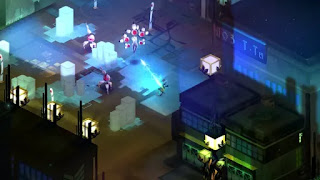The Old City: Leviathan
Developer: PostMod Softworks
Publisher: PostMod Softworks
You are the character Jonah and you wake up alone. You walk through life talking to Leviathan, looking upon the remains of what was. You don't know what you'll find, but there is always a feeling of foreboding.
Jonah, voiced by Ryan Cooper, is a complicated fellow. We only get to know him when he decides to talk to Leviathan or to himself, and that distinction can get a bit blurry. You learn more about Jonah and the people who use to live in the old city by reading letters left laying around the area. Through Jonah you get a distinct understanding that the world lived through some sort of horrible calamity and Jonah might be the last human alive. As you might have predicted, Jonah isn't going to be the most reliable narrator of The Old City: Leviathan.
The art of The Old City: Leviathan is visually fantastic in a nostalgic, decaying kind of look. The way that lighting streams through the darkness of buildings and caves is so well done that you can see floating bits of dust in the light. That sort of detail is truly appreciated to give the world a more real feeling despite its surreal nature. Then there's the sculptures and buildings and the strange giant animals are all rendered in a way that makes you feel like you've been here before. All these tiny details added to the bigger imagery of The Old City: Leviathan makes the game realer and then emphasizes the surrealism when you walk into it.
The music of The Old City: Leviathan by Atrium Carceri is a mix of what you expect from horror movies, melancholy feelings, and enchanting fairy tales. Like your friend or family member died in a horrible way and you miss them, but they always had a joking attitude towards life and you know that they would want you to tell awful jokes about what happened and who they were like. That's the feeling The Old City: Leviathan music gives in my opinion. You're always alone with your thoughts in this game, so it is more likely that the feeling of horror will weigh on you than any other feelings.
The game play of The Old City: Leviathan is simple enough. You just have to move around and explore. There are no puzzles to solve, there are no traps you get yourself into, and there are no bad guys to beat up. All you're doing is looking around and listening; easy for anyone to play.
You can find The Old City: Leviathan at Steam: $5.99.
I'm not much for horror, and I felt like this game had horror elements, but I'm probably just a pansy. Hope you guys enjoy this game, I give it a 5/5 stars.






















